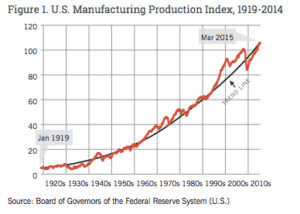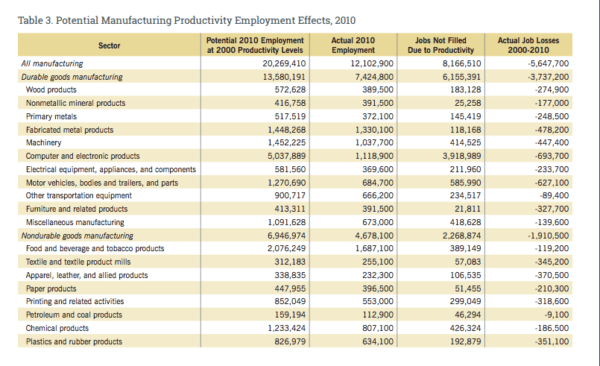Ricochet is the best place on the internet to discuss the issues of the day, either through commenting on posts or writing your own for our active and dynamic community in a fully moderated environment. In addition, the Ricochet Audio Network offers over 50 original podcasts with new episodes released every day.
 Reversing Automation
Reversing Automation
Yesterday I asked what parts of NAFTA people on Ricochet would want to see renegotiated or abrogated. After reading the responses, I’m still not sure whether people here think that free trade is good, but NAFTA disadvantages the United States — that it’s not a level playing field, in other words — or whether we’ve got real support here for mercantilism.
I’m open to the idea that Adam Smith was wrong and free trade doesn’t, in fact, benefit everyone. I’ve been arguing, though, that it’s not trade that’s killed manufacturing jobs. It’s automation.
What if both are true? Here’s an interesting study from Ball State University: The Myth and the Reality of Manufacturing in America. It focuses on the effects of productivity change, domestic demand, and foreign trade on American manufacturing employment.
Although it took a hit during the Great Recession, the trend lines on production are clear: Manufacturing is not in decline in America:

In fact, it’s at record highs.
The increased productivity is largely the consequence of the industrial use of information technology:
In 1998, the inflation-adjusted output per worker was much lower than it is today. This is due to a variety of factors, chief among them being the automation and information technology advances absorbed by these sectors over this time period. The higher output per worker has meant firms could lower their price for goods. Very clear examples of this are the price indices for different types of consumer electronics.
We have people here who argue that free trade is beneficial, but our trade agreements aren’t fair. We also have people who argue that trade itself has cost jobs, or at least, that it hasn’t been obviously beneficial. No matter your stance on that debate, I think you’ll agree that the problem of automation’s effect on employment will remain:

The authors of the study endorse the idea that trade has cost us jobs: “The most scholarly work in this area (Ocemoglu, et. al. 2014) estimates employment losses in the United States due to imports from 1999-2013 in the 2.0 million to 2.4 million range.” But they argue that this only accounts for 13.4 percent of lost jobs.
So here’s my question: If we’re jettisoning free-trade orthodoxy, why not do it in a way that will bring back many jobs, not just 13.4 percent of them, at best? Why not ban the industrial use of information technology? Or at the very least, why not legislate steps that will strengthen rather than weaken unions, given that trade unions probably know better than anyone what’s costing them their jobs? Trade unions predicted the circumstances in which we find ourselves, and they seem to have a point about what would happen if the American working class confronted long-term employment precarity.
Here’s a 1983 survey of labor unions. Only 14 percent of unions advocated technology change; and most were only willing to accept it if its impact on the workforce could be minimized. This is why economists tend to find an inverse relationship between innovation and unionization.
You may say, “Well, obviously we don’t want to suffocate innovation. That would be bad for the economy.” But we have an economy that seems only to benefit urban elites. The Rust Belt made it overwhelmingly clear that it wants its jobs back and doesn’t want to hear one more word about laissez-faire economic theories. Unless Keynes was right all along, a big burst of spending on infrastructure projects won’t in the long term bring back those jobs. (It will be great for patronage and cronyism, however.)
Perhaps innovation — Silicon Valley, in other words — needs to take the hit for a while?
Published in General



Agreed! It comes almost exclusively from democrats, and I am in favor of the government backing out of trade altogether. The difference between a crony-capitalist and a union? Pretty much zip.
The second post in my series Attack of the Job-Killing Robots is now up.
How exactly are all industries experiencing displacement? Automation is something that has always been with us. How is the automobile (automation) any different from computerized tellers (automation)? I understand that you’re saying that it is different, but I fail to see how it is different.
Haha – yes, I am very anti-union. Maybe because I personally feel the impacts. My wife is in a forced-union job… I pay for my kids to go to school, and for my kids to not go to school, because of unions.
Regardless, I do agree with the idea that workers should be able to have some bargaining power by organizing into groups, but it is when those groups use intimidation or government force that they cease to be legitimate. When government mandates union participation, that’s a monopoly power. If a group of workers wants to put their heads together to negotiate, that seems fine – an employer may fire them all or he may see the point in what they’re arguing. I still hesitate to see when it would ever be useful… especially as they virtually always devolve into intimidation rackets.
There’s a reason you see stuff like this:
If you don’t think unions exist to protect specific workers from the natural impacts of markets, go out and meet a few who are most involved in union activity.
It’s a joke in our courtroom among attorneys…
“guess who the union reps are?”
Even the liberal attorneys understand that it is people who are completely unqualified, are incompetent, or should for any other reason have been fired long ago. If you are competitive, you don’t need a union. The only purpose of a union is to interfere with markets, which means they always result in making things worse. Funny thing, you always hear them say things like “unions gave us the 5 day work week” or “unions gave us the 8 hour day” or “unions give us vacation and a living wage.” Of course, it is in the private sector that you see places like Google or various video game design companies… workers with on-campus massage parlors, no set hours, etc… etc… etc… because employers are always motivated to treat employees well when those employees mean that the business can thrive. The flip side of that is that if you do not provide a useful service, you don’t have a job. (or, more realistically, you have a different job)
A significant number of the jobs that “require a college degree” are listed that way only because some hiring manager or HR person was a credentialism, or simply wanted to cut down on the flood of resumes, rather than because of a genuine need for some kind of knowledge attained only in college.
The degree tells you that the candidate is capable of seeing a project through in some fashion, and that s/he will probably be able to put up with whatever [CoC] s/he’ll encounter in your workplace.
I think this is less true than it maybe once was. Certainly the Crybullies now so active in America’s universities do not seem to have much of this sort of resilience.
In any event, there are plenty of other indicators of an individual’s ability to see a project through, or lack of same.
Sure, but you’re operating on the assumption that the only jobs available are the jobs that have always been available. But that’s the thing about innovation. How many people are employed in the cellphone industry right now? That is an entire industry that didn’t even exist when I graduated high school, and that was less than 20 years ago!
True. But so do many other things, to an astute hiring manager.
In the 1920s-1930s, manufacturing jobs were being replaced by technologies such as the continuous-strip milling steel and automated assembly systems. Clerical jobs were being replaced by punched card equipment and bookkeeping machines. Local musicians were losing their jobs to talking pictures, radio, and phonographs. Telephone operators and telegraphers were being replaced by dial systems and teleprinters. Jobs in printing were being eliminated by sheet-feeding equipment; the manual typesetting jobs were mostly already gone.
So, I don’t think the advance of automation in all industries simultaneously is really something unprecedented. See my post on the Attack of The Job-Killing Robots, which discusses some of the labor-saving technologies of yesteryear and the political/social debates that they inspired.
All of that, I’m sure, is true. But that’s all about what happened in the past.
The recovery from displacement has happened before — but this time, I’m the one in the crosshairs of displacement, and I’m not seeing where the recovery is going to come. I’m sure it’s right around the corner. Really. Just about any moment now …
We all are and this is different. The change, I think, will come in the perception of what work is. The next generations will see work as something you do while you are doing other things. Everyone will be putting in as much time as they feel like.
I think it’s important to think about this for lots of reasons but it’s particularly interesting politically.For most of human history work was a burden. In recent human history it has been sanctified. However, even this recent sanctification hasn’t stopped us from overcoming it. We still seek to get more out of less. And we’re winning.
If work is relegated to an insignificant, somewhat irritating necessity, what does that mean? If one can earn a living by specializing in something particular and doing that thing 20 hours a week, what does that mean? If that 20 hours is split between 4 employers, what does that mean?
Taxes, benefits, transportation policy, urban planning, suburban planning, retirement… none of that will work like it does now.
And we’ll have lots more free time. More play? Binge watching, drinking, etc? Or more leisure? Taking in the symphony, gardening, painting?
Are we properly ordering ourselves to make use of our free time or will we use that time wastefully? How should we then think about education?
Here’s something I threw out in April.
True, but hiring managers are likely to get fired and their companies sued if they rely on being astute.